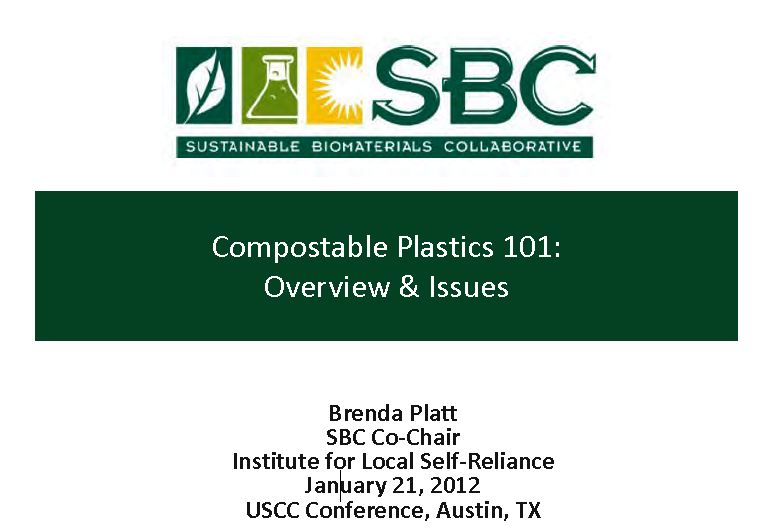Impressions of Recycling Reconsidered By Samantha MacBride
Reviewed for GreenYes Listserve
Ms. MacBride makes zero waste one of her central concerns. She provides the best description and analysis of the recycling movement I have seen to date. It is not perfect, but she captures the nuances that link and yet differentiate components of the movement.
The great achievement of the book is MacBride’s critical evaluation of the practice of recycling in the US. She argues that recycling and economic development and zero waste activists are wasting their time. The movement really has not made a significant impact. Why not move on? Their efforts may have even hampered solutions to the solid waste management problems we face. It is important reading for new comers to the field and her historical overview will prove useful reading for older activists about the evolution of our field since the industrial age.
The analyses of the plastic and glass industry are superb; and the conclusion that recyclers, local governments and others have been duped by corporate cooptation and disillusionment is spot on. While MacBride does not say so directly, it becomes clear that current state bottle bills are a gift to industry that helps them avoid the return of refillables. This would be a setback for the national brands as their market share would be at risk from local producers. Bottle Bills are not a victory; only refillables are the prize for a sustainable economy. MacBride hits her stride when she describes the contortions the economy and cities go through to manage the glass and plastic in our midst. Curiously, she suddenly drops consideration of refillables.
My perspective on recycling diverges from MacBride’s at this point. Ms. MacBride firmly believes that bottom up recycling efforts, while laudatory application of idealism, have not and can never have a major impact. Recycling as practiced lacks scale. Its vision is bigger than can possibly be achieved. She says this as her book catalogues the remarkable achievements of the grassroots recycling movement, including the myriad new rules, new ways of thinking and a new economic development paradigm that is guiding policymakers in the real world. Yet, according to MacBride, these were motivated by an ideology, not a set of normative values. This is surprising for an author who quotes Gramsci, the greatest 20th Century analyst and commentator on Marx and Engels who defined the modern concept of ideology. In the real world, recycling includes millions of jobs, half-trillion dollars in annual sales, and over 50,000 businesses and 10,000 government programs. In addition, billions of pound of pollutants from manufacturing, extraction and disposal have been avoided. OK, so tell me what does a significant impact look like if not this track record? A track record that is on an ever-expanding trajectory!
Recycling and zero waste initiatives have made too small of an impact, according to Recycling Reconsidered. But isn’t any failure to make greater impact, more a sign of the influence of huge manufacturers and waste disposal corporations and international rules of Free Trade than of the inherent inability of moving significantly to zero waste from a bottom-up perspective. There is no question that the volume of garbage has outpaced the growth in recycling, composting and reuse. But the recycling movement has built a foundation and policies and a narrative that can build on that foundation and move to the next level. That policies at the state and federal (and possibly international level as well given the WTO) might be needed is true, but they grow out of the growth of the experience and successes of recycling at the local and regional level.
In her lament against localism, the author overlooks the fact that garbage collection is under the purview of local governments and that half the discard stream – organics and construction and demolition debris – has to be marketed locally. Further, bottom up has gotten San Francisco to 75% diversion using technology, messaging and rules than can be adopted and adapted in any jurisdiction. They are limited not by local actions but by national- and international-level actions beyond the control of a city.
That the recycling movement is blamed for not achieving total victory against hugely powerful self-interested corporations overlooks the significant victories that have been achieved. For example citizen-inspired laws in Massachusetts and Wisconsin have banned disposal of construction and demolition (C&D) discards. San Francisco and other cities have implemented bonding programs to guarantee C&D debris recycling. C&D debris amounts to 250 million tons per year, about as much as municipal solid waste (MSW). Recycling rates in this sector are about double the recycling rate for MSW. Other laws ban yard debris from landfills and incinerators redirecting tens of millions of tons of material a year to proper uses.
Oddly, Ms. MacBride singles out what is probably the best known and successful recycling enterprise in the country, Urban Ore, for criticism. This small profit making company grosses several million a year and supports scores of workers. It also diverts 98% of the materials it handles back into the economy, but is criticized for not having gotten Berkeley, CA, to zero waste yet. A more substantial argument would be to discuss what would happen if either Dan Knapp or Mary Lou Van Deventer, Urban Ore’s owners, were Mayor of Berkeley and persuaded the city council to enact their ‘total recycling’ measures.
The failures of New York City’s recycling are meticulously detailed, with many excellent lessons drawn from the good, bad and ugly developments that have occurred. Yet Ms. MacBride fails to put this in context: fifty years of mayors trying to build giant incinerators in every borough. The emphasis on NYC in MacBride’s story is unfortunate. NYC is not typical of the US recycling movement. The stories of San Francisco, Los Angeles, Austin, Atlanta, King County, WA, and Alachua County, FL, are far more indicative of the recycling movement’s trajectory toward zero waste.
Astonishingly, Ms MacBride claims that incinerators are cheap. The waste-to-energy issue is not a main focus of her attention, even as it has been a driving force in the mobilization of citizen activists for 45 years.
The chapters on textile recycling and extended producer responsibility (EPR) are excellent contributions to our understanding and dialogue. I defer comments on the textile chapter until I can review with grassroots textile entrepreneur Terry McDonald of Saint Vincent de Paul of Lane County, Eugene, OR.
MacBride calls for federal mandates on EPR and other initiatives. That would be lovely, but any shortcomings on recycling at the local level pale into insignificance compared to the malfeasance and opposition at the federal level. And, EPR laws and regulations have been aptly introduced at the state and local levels. They need to be adopted and adapted, not co-opted by federal laws that would inevitably be written by industry consultants.
Naturally, MacBride’s EPR discussion could not benefit from new analysis coming from the June 2011 national meeting on EPR held by the Illinois Recycling Association. These papers are due out any day. Suffice to say at this point, that it is clear that EPR is not a panacea and its practice in British Columbia, the leading EPR jurisdiction, is flawed. (See, Neil Seldman and Nadine Souto, “Extended Producer responsibility in British Columbia – A Work at Risk.”) In British Columbia EPR and the bottling industry are one in the same. Ironically, an EPR bureaucracy, despite the fact that the Canadian beer industry has determined that refillables are the ideal way to keep costs down, meet customer needs and keep the giant companies from destroying their markets, has discarded refillables. EPR has proven to be an elusive tool. Sure we want industry to take back their toxic materials from communities, but do we want the brand name corporations to also take away working machines, working parts, valuable alloys? EPR has to be integrated into the local economy.
A top down strategy not only has far, far fewer chances of success than a grassroots strategy, but it saps the energy of the grassroots. Citizen organizing is one of the great legacies of the recycling movement. Hundreds of thousands of citizens have been mobilized to fight the financial and environmental threats posed by landfills and incinerators and runaway packaging and production. As these citizens enter politics, they can help change the rules from the bottom up as well as the top down. This may be the greatest contribution the recycling movement makes to civic society.
The theme that the US recycling movement is benighted, that recyclers are wasting their time, is not new. Liberal economists (Frank Ackerman), The New York Times contrarian Tierney, left wing critics (O’Connor and Cockburn) and of course right-wing pundits who can’t stand that citizens forced new rules on corporations (remember the Fox News attack on Annie Leonard) have weighed in over the years. It is unfortunate that MacBride’s perspective so overlaps these others, even as it adds greatly to our understanding in many ways.
Nevertheless, people should read this book for its vast quantity of very important information. I believe her suggestions for federal mandates are wrong. Her suggestions for reconfigured collection of materials must deal with numerous practical considerations, but should be considered by haulers and planners. The history and analysis of the resource management issue are very helpful both for what they point out and for what they miss. (Perhaps more on this from me later as I ponder the conditions of recycling workers in many public programs and private companies.) The book will make recyclers smarter and stronger in approaching the challenges ahead.




